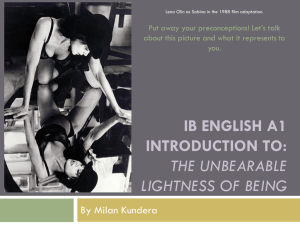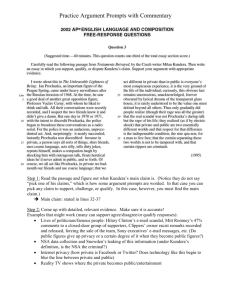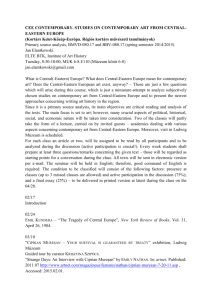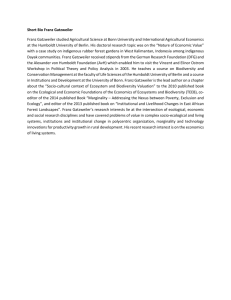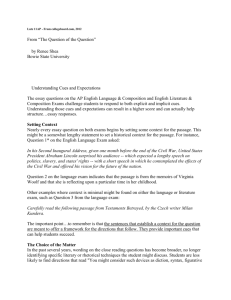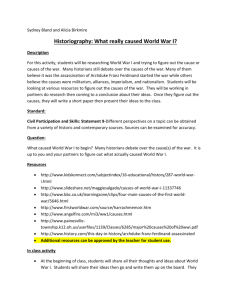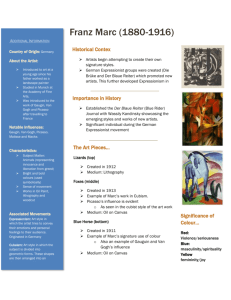music minus memory - Department of English at Cornell University
advertisement
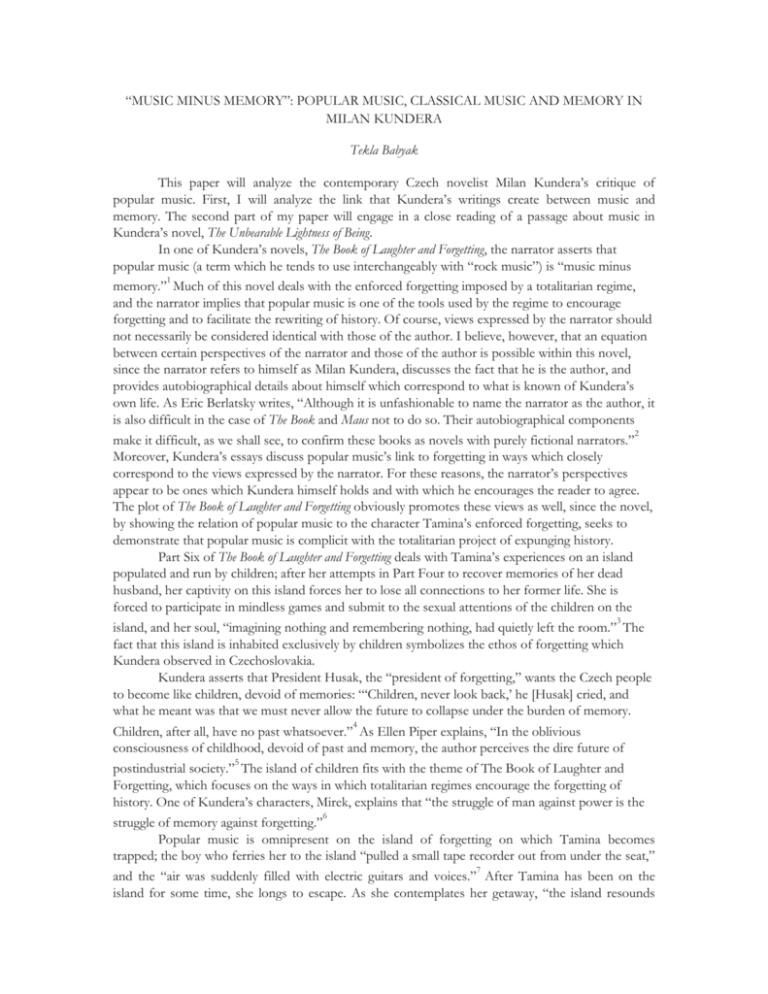
“MUSIC MINUS MEMORY”: POPULAR MUSIC, CLASSICAL MUSIC AND MEMORY IN MILAN KUNDERA Tekla Babyak This paper will analyze the contemporary Czech novelist Milan Kundera’s critique of popular music. First, I will analyze the link that Kundera’s writings create between music and memory. The second part of my paper will engage in a close reading of a passage about music in Kundera’s novel, The Unbearable Lightness of Being. In one of Kundera’s novels, The Book of Laughter and Forgetting, the narrator asserts that popular music (a term which he tends to use interchangeably with “rock music”) is “music minus 1 memory.” Much of this novel deals with the enforced forgetting imposed by a totalitarian regime, and the narrator implies that popular music is one of the tools used by the regime to encourage forgetting and to facilitate the rewriting of history. Of course, views expressed by the narrator should not necessarily be considered identical with those of the author. I believe, however, that an equation between certain perspectives of the narrator and those of the author is possible within this novel, since the narrator refers to himself as Milan Kundera, discusses the fact that he is the author, and provides autobiographical details about himself which correspond to what is known of Kundera’s own life. As Eric Berlatsky writes, “Although it is unfashionable to name the narrator as the author, it is also difficult in the case of The Book and Maus not to do so. Their autobiographical components 2 make it difficult, as we shall see, to confirm these books as novels with purely fictional narrators.” Moreover, Kundera’s essays discuss popular music’s link to forgetting in ways which closely correspond to the views expressed by the narrator. For these reasons, the narrator’s perspectives appear to be ones which Kundera himself holds and with which he encourages the reader to agree. The plot of The Book of Laughter and Forgetting obviously promotes these views as well, since the novel, by showing the relation of popular music to the character Tamina’s enforced forgetting, seeks to demonstrate that popular music is complicit with the totalitarian project of expunging history. Part Six of The Book of Laughter and Forgetting deals with Tamina’s experiences on an island populated and run by children; after her attempts in Part Four to recover memories of her dead husband, her captivity on this island forces her to lose all connections to her former life. She is forced to participate in mindless games and submit to the sexual attentions of the children on the 3 island, and her soul, “imagining nothing and remembering nothing, had quietly left the room.” The fact that this island is inhabited exclusively by children symbolizes the ethos of forgetting which Kundera observed in Czechoslovakia. Kundera asserts that President Husak, the “president of forgetting,” wants the Czech people to become like children, devoid of memories: “‘Children, never look back,’ he [Husak] cried, and what he meant was that we must never allow the future to collapse under the burden of memory. 4 Children, after all, have no past whatsoever.” As Ellen Piper explains, “In the oblivious consciousness of childhood, devoid of past and memory, the author perceives the dire future of 5 postindustrial society.” The island of children fits with the theme of The Book of Laughter and Forgetting, which focuses on the ways in which totalitarian regimes encourage the forgetting of history. One of Kundera’s characters, Mirek, explains that “the struggle of man against power is the 6 struggle of memory against forgetting.” Popular music is omnipresent on the island of forgetting on which Tamina becomes trapped; the boy who ferries her to the island “pulled a small tape recorder out from under the seat,” 7 and the “air was suddenly filled with electric guitars and voices.” After Tamina has been on the island for some time, she longs to escape. As she contemplates her getaway, “the island resounds 8 with the roar of song and the din of guitars.” In fact, the revulsion which Tamina feels for the children’s response to popular music appears to lead to her decision to leave immediately: “And the idiocy of the guitars keeps booming, the children keep dancing, flirtatiously undulating their little bellies. It is little things of no weight at all that are making Tamina nauseous. In fact, that hollow feeling in her stomach comes from the unbearable absence of weight. And just as one extreme may at any moment turn into its opposite, so this perfect buoyancy has become a terrifying burden of 9 buoyancy, and Tamina knows she cannot bear it another instant. She turns and runs.” In the middle of Part Six, the narrator intervenes with a passage about music history and the end of great music, and he asserts that popular music is an attempt to “make an occupied country forget the bitterness of 10 history and devote all its energy to the joys of everyday life.” It is in this section that the narrator declares popular music to be music minus memory. Kundera’s belief that popular music lacks memory suggests that classical music does contain an awareness of memory. I would like to analyze which kinds of memory he believes classical music possesses— memory of historical/political events, memory of the Western musical tradition, etc. In his essay, “Paths in the Fog,” he implies that popular music is used as a means of forgetting the pain of history, which suggests that he believes that classical music does contain an awareness of historical suffering. “The music (commonly and vaguely) called ‘rock’ has been inundating the sonic environment of daily life for twenty years; it seized possession of the world at the very moment when the twentieth century was disgustedly vomiting up its history; a question haunts me: was this coincidence mere chance? Or is there some hidden meaning to the conjunction of the century’s final trials and the ecstasy of rock? Is the century hoping to forget itself in this ecstatic howling? To forget 11 its utopias foundering in horror? To forget its art?” Kundera views the cultural rejection of art as evidence of a widespread desire to forget, a forgetting which he suggests would not be possible if great art, a testament to history, were to survive. George Orwell’s 1984 similarly implies that the totalitarian state wishes to expunge, or at least rewrite, the great works of the past, in order to allow for complete forgetting and manipulation of history. The character Syme explains that “‘By 2050—earlier, probably, all real knowledge of Oldspeak will have disappeared. The whole literature of the past will have been destroyed. Chaucer, Shakespeare, Milton, Byron—they’ll exist only in Newspeak versions, not merely changed into 12 something different, but actually changed into something contradictory of what they used to be.’” Theodor Adorno, much like Kundera, believes that classical music is a bearer of memory which forces listeners to remember the pain of history. Adorno writes that modern music “has taken 13 upon itself all the darkness and guilt of the world.” He was disturbed by the thought of art that would refuse to remember the atrocities of history, since he believes that such art would be an injustice against those who have suffered persecution. In the end of Aesthetic Theory, he allows himself a (rare) speculation that the future may be better than the present, and that the affirmative art of the past may be more relevant to a future society than it is to our current damaged world: “If today art has become the ideological complement of a world not at peace, it is possible that the art of 14 the past will someday devolve upon society at peace.” This possibility, however, alarms Adorno as soon as he has expressed it: “It would, however, amount to the sacrifice of its freedom were new art 15 to return to peace and order, to affirmative replication and harmony.” He becomes concerned that future art may be affirmative and peaceful; if this were to occur, it would be a crime against those who have suffered. Art must take upon itself the guilt of society, so it would be wrong for artworks to be beautiful and harmonious in a traditional sense. He ends his book by stating “but then what 16 would art be, as the writing of history, if it shook off the memory of accumulated suffering.” In addition to believing that classical music contains historical awareness which popular music lacks, Kundera also implies that another of the types of memory possessed by classical music is the memory of music history. For example, he characterizes pop star Karel Gott’s music, which he believes is devoid of memory, as “music in which the bones of Beethoven and Ellington, the dust of 17 Palestrina and Schoenberg, lie buried.” This remark implies that popular music has forgotten the musical canon and is music with no awareness of tradition and no engagement with the compositional techniques developed over centuries of music history. In contrast to popular music, from which he believes the memory of the musical past has been obliterated, he asserts that modernist music, the music which he believes came just before the collapse of music, has an acute awareness of music history. “In Stravinsky’s work, European music recalled its thousand-year history 18 that was its final dream before setting out for an eternal dreamless sleep.” Kundera argues that the memory of the great composers was killed by the deluge of “sewage-water music in which music is dying,” and that “the future was a river, a flood of water where composers’ corpses drifted among the fallen leaves and torn-away branches. One day Schoenberg’s dead body, bobbing about in the raging waves, collided with Stravinsky’s, and in a shamefaced late-day reconciliation the two of them 19 journeyed on together toward nothingness (toward the nothingness of music that is absolute din).” In a scene in The Book of Laughter and Forgetting, Kundera relates a scene with his father which is obviously intended as a demonstration of the links between the forgetting of history, the omnipresence of popular music, and the forgetting of classical music—or, in this case, the forgetting of how to speak about classical music. Kundera explains that his father suffered from memory loss during the last years of his life, and was unable to recall enough words to speak coherently. His father wanted to tell him why Beethoven chose to use variation form, but his memory loss made it impossible for him to convey his thoughts. Kundera writes that “Through the ten years of his illness Father worked steadily on a long study of Beethoven’s sonatas. He wrote somewhat better than he spoke, but even while writing he would suffer more and more memory lapses until finally no one 20 could understand the text–it was made up of words that did not exist.” His father sought in vain to find the words to share his insights about Beethoven with Kundera: “Once he called me into his room. The variations from the Opus 111 sonata were open on the piano. ‘Look,’ he said, pointing to the music (he had also lost the ability to play the piano), ‘look.’ He kept trying to explain something 21 important to me, but the words he used were completely unintelligible.” Kundera links his father’s forgetting to the forgetting of Czech history, as well as to the island where Tamina is forced to live with children who have no memories: “The silence of my father, whom all words eluded, the silence of the hundred and forty-five historians, who have been forbidden to remember, that myriad-voiced silence resounding from all over my country forms the 22 background of the picture against which I paint Tamina.” The death of Kundera’s father is preceded by a period of memory loss, just as the death of Czechoslovakia is preceded by the forgetting of Czech history. Kundera quotes his friend Milan Hubl as having said, “‘The first step in 23 liquidating a people . . . is to erase its memory.’” The erasure of this memory is associated with the disappearance of classical music, and the erasure of his father’s memory leads to his inability to remember the words needed to speak about classical music. According to Kundera, which aspects of popular music render it devoid of memory? He appears to attribute its lack of memory to the music rather than the lyrics. In “Paths in the Fog,” for example, he argues that there is no melodic development in popular music, and that this lack of development is linked to the lack of memory possessed by this music. He writes that popular music “is the prolongation of a single moment of ecstasy; and since ecstasy is a moment wrenched out of time—a brief moment without memory, a moment surrounded by forgetting—the melodic motif has 24 no room to develop, it only repeats, without evolving or concluding.” The same idea appears in “Improvisation in Homage to Stravinsky”: “Ecstasy, on the other hand, cannot be mirrored in a melody, because memory strangled by ecstasy is incapable of retaining the sequence of notes in a 25 melodic phrase, however short.” This assertion can serve as a key to interpreting his belief that popular music is “music minus memory,” since it reveals that he associates memory with specific musical processes— processes which may be related to variation or development techniques. Kundera is especially fond of musical variation, and actually states that he has modeled certain of his novels on this 26 compositional technique: “This entire book is a novel in the form of variations.” Obviously, variation is a quite intense type of musical memory, since the music does not “forget” its main theme, but rather focuses on this theme throughout. Kundera appears to equate music’s memory of its own material with the presence of other types of memory in music, such as memory of political and musical history. It may seem unusual that Kundera expects music to possess memory, since he frequently describes personal memory as being quite fragile and constantly susceptible to distortion. In light of his insistence that music serve as a bearer of memory, it is surprising that he views memory as so unstable and unreliable. Perhaps he believes that music should help keep memories alive which would otherwise vanish. He is quite focused on the difficulty of retaining memory, and he believes that people feel a need to find means by which past memories can be recalled. One of these means is contact with people from one’s past: “For memory to function well, it needs constant practice: if 27 recollections are not evoked again and again, in conversations with friends, they go.” Similarly, in Identity, the character Jean-Marc decides that the function of friendship is “to provide a mirror so the other person can contemplate his image from the past, which, without the eternal blah-blah of 28 memories between pals, would long ago have disappeared.” Kundera is also, of course, aware that people may not always wish to retain an accurate portrait of their past, and that people, just like governments, may desire to remake the past in order to obliterate or alter unwanted memories: “Mirek is as much a rewriter of history as the Communist Party, all political parties, all nations, all 29 men.” For Kundera, classical music appears to be a means of preventing this type of irresponsible rewriting of history, as well as a means of preserving memories which could otherwise unintentionally be forgotten due to the imperfection of human memory. Kundera’s equation of classical music with memory, and popular music with forgetting, may appear to be absolute. There is, however, one interesting exception, one place where he actually links popular music to memory, albeit pejoratively, since he links it to memory of that which he considers undesirable: memory of death. In his discussion of 63 words which he uses frequently in his novels, he writes under rhythm: “The tedious rhythmic primitivism of rock: the heart’s beat is amplified so 30 that man can never for a moment forget his march toward death.” Kundera believes that classical music, on the other hand, plays with rhythm in such a way as to conceal the sense of bar lines marking out our progression toward death: “The greatest masters of rhythm knew how to silence that monotonous and predictable regularity, and transform their music into a little enclave of ‘time 31 outside time.’” Perhaps Kundera’s hatred of popular music is based as much on what this music forces us to remember as what it forces us to forget, although he does not, unfortunately, discuss this idea elsewhere. In the section entitled “Music” in Kundera’s The Unbearable Lightness of Being, two radically different views of music are presented. Franz loves the music of today as well as the music of the past, and makes “no distinction between ‘classical’ music and ‘pop.’ He found the distinction old32 fashioned and hypocritical. He loved rock as much as Mozart.” Sabina, Franz’s mistress, despises contemporary music and takes a quite pessimistic view of the future of music: “Abroad, she discovered that the transformation of music into noise was a planetary 33 process by which mankind was entering the historical phase of total ugliness.” Sabina longs to escape from the constant sounds of popular music blaring from speakers everywhere: “Noise masked 34 as music had pursued her since early childhood.” I would like to explore the extent to which this passage allows the reader to determine the novel’s attitude toward popular music. Is the reader encouraged to accept either of the two positions expressed, or is it impossible to determine which position the novel is endorsing? As we have seen, an examination of Kundera’s writings reveals that he is sharply critical of popular music and perceives it much as Sabina does. Based on the negative attitudes toward popular music which he expresses in his other novels and essays, it would appear that The Unbearable Lightness of Being would encourage the reader to agree with Sabina’s view of music rather than Franz’s. I believe that this hypothesis is correct, since there are indications throughout the novel that the narrator frequently perceives Franz’s views as wrong and believes that Sabina is far more perceptive. In fact, Italo Calvino asserts that “at the opposite extreme of Franz, his temporary partner Sabina, by virtue of her lucid mind, acts as the author’s mouthpiece, establishing comparisons and contrasts and parallels between the experience of the Communist society in which she grew up and the Western 35 experience.” Before engaging in a close reading of the passage on music, some background information on Franz and Sabina is necessary. Sabina, an artist, first enters the novel as one of Tomas’ many mistresses in Prague. She soon immigrates to Switzerland, where she meets Franz, a professor and native of Switzerland. The two have extremely different backgrounds; Sabina’s views of life are largely shaped by her experiences in a communist country, while Franz, always having led a privileged life, believes that aspects of communist life sound enticing and even thrilling. The fact that Franz envies Sabina certain elements of communist life should be seen as a cue that Franz’s views are misguided: in a novel which depicts the tragic effects of the communist regime, the reader is not encouraged to agree with a character who longs for the excitement of communist life. Franz’s passion for communist life, which he has never experienced, is discussed in the section “Misunderstood Words,” the same section which contains the passage on music. In this section, the words which Franz and Sabina perceive differently are discussed, and their divergent definitions of these words are analyzed. Interestingly, Kundera uses a musical metaphor to explain that Franz and Sabina have developed quite different views of certain words: “When people are fairly young and the musical composition of their lives is still in its opening bars, they can go about writing it together and exchange motifs . . . but if they meet when they are older, like Franz and Sabina, their musical compositions are more or less complete, and every motif, every object, every word means something 36 different to each of them.” “Sabina’s Country” is one of these words. “Franz greatly admired Sabina’s country. Whenever she told him about herself and her friends from home, Franz heard the words ‘prison,’ ‘persecution,’ ‘enemy tanks,’ ‘emigration,’ ‘pamphlets,’ ‘banned books,’ ‘banned 37 exhibitions,’ and he felt a curious mixture of envy and nostalgia.” This foolishly romantic longing for the drama of communist life is contrasted with Sabina’s painful knowledge of what it is like to suffer the very real consequences of this drama: “The trouble was that Sabina had no love for that drama. The words ‘prison,’ ‘persecution,’ ‘banned books,’ ‘occupation,’ ‘tanks’ were ugly, without the 38 slightest trace of romance.” Just as the section on Sabina’s country encourages the reader to reject Franz’s uninsightful and idealized view of communist life, the section on music similarly critiques Franz’s attitude toward music. Franz perceives music as a means of escape from his disciplined, logocentric life as a scholar. “He considered music a liberating force; it liberated him from loneliness, introversion, the dust of the library; it opened the door of his body and allowed his soul to step out into the world to make 39 friends.” He mistrusts words and believes that music is the antithesis to the pointlessness and meaninglessness of the logos: “And what he yearned for at that moment, vaguely but with all his might, was unbounded music, absolute sound, a pleasant and happy all-encompassing, overpowering, window-rattling din to engulf, once and for all, the pain, the futility, the vanity of words. Music was 40 the negation of sentences, music was the anti-word!” Stephen Benson argues persuasively that Franz’s attitude is presented as an expression (I would say a parody, due to the hyperbolic tone) of a widespread belief in music as the antithesis to language. Benson explains that “As Kundera is eager to demonstrate, a belief in music’s palliative care is far from the only way of conceiving the relation between music and language; indeed, as we shall see, it is far from Kundera’s own construction. However, it serves here as an expression of a commonly held construction, whereby music is 41 somehow extracultural, an escape from the messy contingencies of life in the language world.” As Benson points out, it is fairly clear that Kundera is not endorsing Franz’s belief in music as an antidote to the limitations of language. The section on “Parades” makes it even more clear that Franz’s view of music as an escape from the oppression of academic life is unconvincing. In this section, Franz’s desire to escape his logocentric life as a scholar is again mentioned; this time Franz is using parades as a means of getting out of the library to access “real life,” which closely resembles the role that Franz ascribes to music. In the music section, Kundera writes that Franz believes that music “allowed his soul to step out into the world.” Similarly, in the parade section, we learn that Franz loves demonstrations because “he yearned to step out of his life the way one steps out of a house 42 into the street.” The narrator explains that Franz’s view of music, demonstrations and parades as doors leading to the real world is incorrect, since Franz is misinterpreting a dream world as a reality more profound than his daily life as a scholar: “Franz felt his book life to be unreal. He yearned for real life, for the touch of people walking side by side with him, for their shouts. It never occurred to him that what he considered unreal (the work he did in the solitude of the office or library) was in fact his real life, whereas the parades he imagined to be reality were nothing but theater, dance, carnival– in 43 other words, a dream.” Franz believes that music is a means to forget his life and his identity and merge with an intoxicating Dionysian force; in many of his writings, as we have seen, Kundera criticizes popular music for its ability to serve exactly this function, to enable and even encourage people to forget their personal and political problems and escape into a state of Dionysian revelry or cheerful amnesia. Kundera implies that Franz is unable to perceive this danger of popular music, but Sabina is quite aware of it. Just as she understood the pain of communism, and Franz’s privileged capitalist life prevented him from realizing the brutality of communist life, Sabina is able to perceive the barbarism of popular music because of her experiences growing up in a communist country. According to Kundera, her enforced exposure to noisy, upbeat music under the communist regime allow her to recognize a larger truth about music today: it has turned into noise and has lost the delicate beauty of past music, the “days of Johann Sebastian Bach, when music was like a rose blooming on a boundless snow-covered plain of silence.” “Noise masked as music had pursued her since early 44 childhood . . . . The music was like a pack of hounds that had been sicked on her.” Kundera suggests that Sabina realizes what Franz does not: that the official optimism of popular music is a means of forcing oppressed people to listen to upbeat music to forget the suffering inflicted upon them by the regime: “She felt like crying, but the music was cheerful, and there was nowhere to hide, not in the latrine or under the bedclothes: everything was in range of the speakers.” Due to this upbringing, when she sought in vain to escape the constant noise of cheerful popular music, she became especially alert to signs of noise being inflicted upon unwilling listeners and recognized the omnipresence of noise in non-communist countries as well: “At the time, she had thought that only in the Communist world could such musical barbarism reign supreme. Abroad, she discovered that the transformation of music into noise was a planetary process by which mankind was entering the historical phase of total ugliness. The total ugliness to come had made itself felt first as omnipresent acoustical ugliness: cars, motorcycles, electric guitars, drills, loudspeakers, sirens. The 45 omnipresence of visual ugliness would soon follow.” Sabina’s views of music are obviously the result of her communist upbringing, and as a reflection of what a perceptive person will experience and come to believe under this regime, her views are presented as quite accurate. Is there room, however, to believe that Sabina’s negative attitude toward popular music has been influenced too strongly by communism for it to be entirely applicable to music in non-communist countries? The novel does not imply that Sabina’s views are biased or skewed due to the oppression of the communist regime—If anything, it implies that this oppression has opened her eyes to all forms of oppression in the world at large—but I believe that it would be possible for a reader to critique Sabina’s view on the basis that her attitudes come from a very specific political context and may not work as well in another. It stands to reason that the novel does not present Sabina’s view as having been limited by her negative experiences in a communist country; since Kundera’s own view of popular music is so similar to that of Sabina’s, it is unlikely that he would encourage the reader to critique Sabina’s view in this way. Such a critique could nevertheless be applied, not only to Sabina’s views, but also to Kundera’s, since his own perspectives on the oppressive quality of popular music were, like Sabina’s, influenced by the use of popular music as propaganda within the communist regime. A critique of Kundera’s own perspectives on music would have to start with the realization that his negative view of popular music is based on his experiences within a political context which differs markedly from our own, although he seeks to generalize his perspectives and to claim that they apply to contemporary Western culture in general. 1 Milan Kundera, The Book of Laughter and Forgetting, trans. Michael Henry Heim (New York: Penguin Books, 1981) 181. 2 Eric Berlatsky, “Memory as Forgetting: The Problem of the Postmodern in Kundera’s The Book of Laughter and Forgetting and Spiegelman’s Maus,” Cultural Critique 55 (2003) 142. 3 Kundera, The Book 177. 4 Kundera, The Book 187. 5 Ellen Piper, “The Book of Laughter and Forgetting: Kundera’s Narration against Narration,” Milan Kundera (Broomall: Chelsea House Publishers 2003) 64. 6 Kundera, The Book 3. 7 Kundera, The Book 168. 8 Kundera, The Book 187. 9 Kundera, The Book 188. 10 Kundera, The Book 180. 11 Kundera, “Paths in the Fog,” Testaments Betrayed, trans. Linda Asher (New York: HarperCollins 1995) 235. 12 George Orwell, Nineteen Eighty-Four (New York: Plume–Harcourt Brace 2003) 54. 13 Theodor W. Adorno, Philosophy of Modern Music, trans. Anne G. Mitchell and Wesley V. Blomster (New York: Continuum 2002) 133. 14 Adorno, Aesthetic Theory, trans. Robert Hullot-Kentor (Minneapolis: University of Minnesota Press 1997) 260. 15 Adorno, Aesthetic Theory 260. 16 Adorno, Aesthetic Theory 261. 17 Kundera, The Book 181. 18 Kundera, “Improvisation in Homage to Stravinsky,” Testaments Betrayed 78. 19 Kundera, Ignorance, trans. Linda Asher (New York: HarperCollins 2000) 147. 20 Kundera, The Book 160. 21 Kundera, The Book 161. 22 Kundera, The Book 161. 23 Kundera, The Book 159. 24 Kundera, “Paths in the Fog” 235. Kundera, “Improvisation in Homage to Stravinsky” 86. 26 Kundera, The Book 165. 27 Kundera, Ignorance 33. 28 Kundera, Identity, trans. Linda Asher (New York: HarperCollins 1998) 25 10. 29 Kundera, The Book 22. 30 Kundera, The Art of the Novel, trans. Linda Asher (New York: HarperPerennial 1993) 148. 31 Kundera, The Art of the Novel 148. 32 Milan Kundera, The Unbearable Lightness of Being, trans. Michael Henry Heim (New York: Harper & Row, 1984) 92. 33 Unbearable Lightness 93. 34 Unbearable Lightness 93. 35 Italo Calvino, “On Kundera,” Milan Kundera 58. 36 Unbearable Lightness 89. 37 Unbearable Lightness 102. 38 Unbearable Lightness 103-4. 39 Unbearable Lightness 93. 40 Unbearable Lightness 94. 41 Stephen Benson, “For Want of a Better Term?: Polyphony and the Value of Music in Bakhtin and Kundera,” Narrative 11.3 (2003) 292. 42 Unbearable Lightness 99. 43 Unbearable Lightness 100. 44 Unbearable Lightness 93. 45 Unbearable Lightness 93.
